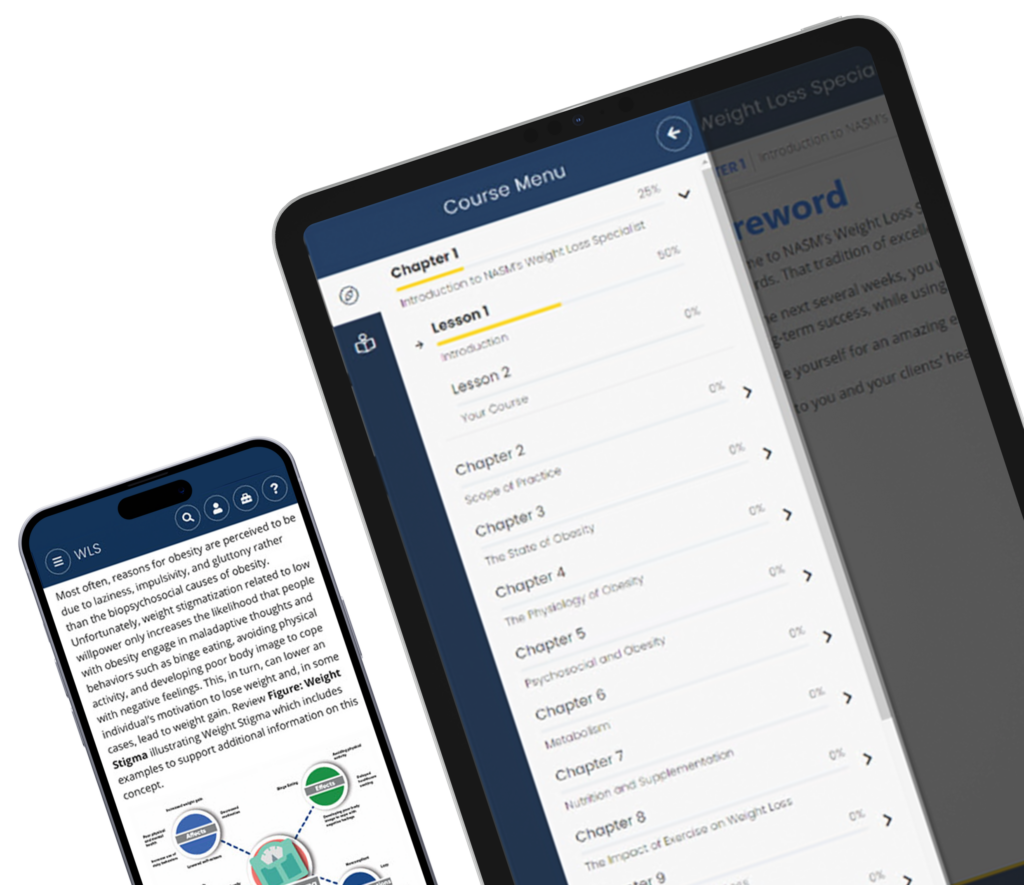
Black friday - 20% OFF
weight loss SPECIALISATION
Expand your expertise and improve your client’s lives

what you'll learn
As a fitness professional, there are two things clients usually come to you for – to look and feel better. With the fully updated and improved NASM Weight Loss Specialist (NASM-WLS), you can help them accomplish just that and so much more!
Thanks to our immersive online experience, you’ll learn evidence-based nutrition, exercise, and behavioural change strategies that will help clients lose weight and keep it off.
By designing weight loss exercise programs that leverage the most up-to-date weight-loss guidelines and methodologies, you’ll help make it easier for clients to integrate effective exercise into their daily routine.
- Master the art of program design addressing an array of behavior change goals
- Learn how to create unique programs designed for specific client needs
- Become an expert on avoiding weight loss obstacles
- Helps clients anticipate and avoid the plateaus that come with weight loss
- Have the ability to explain diet cycles and the effects of dieting
- Define and explain milestones to clients
19
Video Resources
8-10 Weeks
Completion Time
100%
Online Learning
ON THE GO
Learn at your own pace, anywhere


You will have 1 year from the day of enrolment to take your final exam.
No, you do not need to renew your NASM Weight Loss Specialisation. Once you pass your final exam, your NASM-WLS specialisation certificate never expires.
You will have 3 attempts to pass the final exam.
No, is it not required to take the Weight Loss Specialisation program.
NASM-WLS is approved for Continuing Education Units (CEUs) by the following organisations:
1.9 CEUs
19 CEUs
2.0 CECs
10 CIMSPA Endorsed CPD Points
The final exam is administered online within your student portal. It consists of 100 multiple-choice questions and 90 minutes for completion.
Explore the modules
There are no prerequisites for this course. Although the course is primarily intended for personal trainers, fitness coaches, nutrition coaches and other fitness/health professionals, there is no requirement that you be one to take the course.
Chapter 1: Introduction
Review the course structure, program objectives, and meet the client personas that will be used as case studies throughout the course
Chapter 2: Scope of Practice
This chapter provides an overview of the landscape of healthcare and describes where a Weight Loss Specialist fits into the healthcare continuum. Develop an understanding of how to best serve your clients while ensuring you follow best practices.

5 Infographics

3 Videos
3 Printable Handouts
Chapter 3: The State of Obesity
Understand the scope of obesity and how it impacts society and ultimately clients. Learn the primary reasons for obesity and how clients may become obese. These insights are important for understanding clients at a fundamental level and how key drivers of obesity can be addressed by a Weight Loss Specialist.
Chapter 4: The Physiology of Obesity
Learn what changes occur in the body due to obesity and how that can affect the health and physical properties of the body, including the organ systems, hormones, metabolism, and neurobiology. All of these aspects can affect the way people with obesity respond to exercise.
Chapter 5: Psychosocial and Obesity
This chapter will discuss three critical domains of the psychosocial components of obesity: mental health, social influences, and eating disorders. Learn about self-esteem and body image, and how to empathize with your clients over these aspects of mental health. Social influences and social determinants of obesity will be explored in depth and potential solutions to addressing these issues will be provided.

18 Infographics

3 Videos
Chapter 6: Metabolism
Understand the metabolism and how it relates to obesity, including energy balance and energy needs as well as the role of environment and genetics. Learn about the primary theories of what causes obesity from a metabolic standpoint and how a Weight Loss Specialist can operationalise those theories in practice and provide solutions to clients who have difficulty losing weight.
Chapter 7: Nutrition and Supplementation
Understand nutrition, supplementation, and dieting as it relates to obesity. Popular dietary schemes and archetypes have been used to address obesity for decades. Review these diets in detail as well as their efficacy and utility.
Chapter 8: The Impact of Exercise on Weight Loss
Exercise is most commonly thought of as one of the critical components to weight loss; however, exactly how it affects weight loss is often misunderstood. This chapter will provide an in-depth review of how exercise affects weight loss from a calorie expenditure perspective, a metabolic perspective, a health perspective, and the effects of exercise on mental health.
Chapter 9: Psychology of Weight Loss
The psychological effects of weight loss are as important as the physiological ones. This chapter will review five key components of the psychology of weight loss: coping, dieting, will power, adherence, and ambivalence.

36 Infographics

4 Videos
5 Printable Handouts
Chapter 10: The Client Intake Process
A critical component to achieving success as a Weight Loss Specialist is developing a clear, consistent, and thorough intake process. Individuals who require weight loss have specific needs when it comes to assessment. This chapter will review the fundamental components of developing a proper intake process and will provide a set of robust tools for Weight Loss Specialists to use.
Chapter 11: Conducting Fitness Assessments
Understanding the readiness and fitness of a client is imperative for Weight Loss Specialists. These assessments and tests (like calculating calories for goal weights) help the Weight Loss Specialist understand the current state of a client and determine where the appropriate starting point is using a thoughtful, systematic approach.

7 Infographics

4 Videos
15 Printable Handouts
Chapter 12: Nutrition Coaching Strategies for Weight Loss
Learn how to create a weight loss program, how to use strategies to increase adherence to the plan, and how to apply various assessment tools to make modifications during the plan to ensure ongoing success for the client. Learn about behavior change models that have been shown in research to be effective.
Chapter 13: Fitness Coaching Strategies for Weight Loss
Understand how exercise for the individual client differs, how intensity can affect overall energy expenditure via the constrained energy model, and the role of NEAT in the context of fitness coaching and weight loss.
Chapter 14: Integrating Nutrition and Fitness with the Weight Loss Client
Nutrition and fitness coaching are often part of an integrated plan. This chapter will utilise client personas to help you learn how to integrate the nutrition and fitness plans developed for a client. This chapter will provide a straightforward, defined process for how to set up, implement, and evaluate an integrated program for a client.
Chapter 15: Weight Maintenance and Sustainability
Sustainability and setting clients up for long term success is one of the most important aspects for a Weight Loss Specialist to consider. This chapter will review key aspects of how to ensure clients have sustainable results.

11 Infographics

6 Videos
4 Printable Handouts
After the completion of the course, you will take an online final exam from the comfort of your own home, or wherever you prefer to take tests, that consists of 100 questions. Each question will be multiple-choice. The exam is timed and cannot exceed 90 minutes. To pass, you need a score of 70% or higher. Don’t fret though, if you score below that, you have up to 3 attempts to pass.
COURSE PRICE
£740.00
*Pricing subject to change

© Copyright PureGym Personal Training Academy
^Terms and conditions apply.
Gym Career Ltd t/a PureGym Personal Training Academy is a credit broker, not a lender. We do not charge you for credit broking services. We will introduce you to limited finance products available from a number of our partner lenders.

